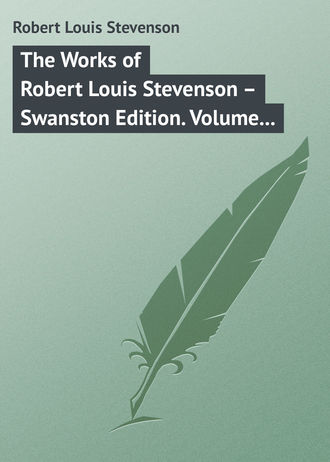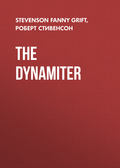
Роберт Льюис Стивенсон
The Works of Robert Louis Stevenson – Swanston Edition. Volume 16
Here is one, exactly as it came to him. It seemed he was the son of a very rich and wicked man, the owner of broad acres and a most damnable temper. The dreamer (and that was the son) had lived much abroad, on purpose to avoid his parent; and when at length he returned to England, it was to find him married again to a young wife, who was supposed to suffer cruelly and to loathe her yoke. Because of this marriage (as the dreamer indistinctly understood) it was desirable for father and son to have a meeting; and yet both being proud and both angry, neither would condescend upon a visit. Meet they did accordingly, in a desolate, sandy country by the sea; and there they quarrelled, and the son, stung by some intolerable insult, struck down the father dead. No suspicion was aroused; the dead man was found and buried, and the dreamer succeeded to the broad estates, and found himself installed under the same roof with his father’s widow, for whom no provision had been made. These two lived very much alone, as people may after a bereavement, sat down to table together, shared the long evenings, and grew daily better friends; until it seemed to him of a sudden that she was prying about dangerous matters, that she had conceived a notion of his guilt, that she watched him and tried him with questions. He drew back from her company as men draw back from a precipice suddenly discovered; and yet so strong was the attraction that he would drift again and again into the old intimacy, and again and again be startled back by some suggestive question or some inexplicable meaning in her eye. So they lived at cross purposes, a life full of broken dialogue, challenging glances, and suppressed passion; until, one day, he saw the woman slipping from the house in a veil, followed her to the station, followed her in the train to the seaside country, and out over the sandhills to the very place where the murder was done. There she began to grope among the bents, he watching her, flat upon his face; and presently she had something in her hand – I cannot remember what it was, but it was deadly evidence against the dreamer – and as she held it up to look at it, perhaps from the shock of the discovery, her foot slipped, and she hung at some peril on the brink of the tall sand-wreaths. He had no thought but to spring up and rescue her; and there they stood face to face, she with that deadly matter openly in her hand – his very presence on the spot another link of proof. It was plain she was about to speak, but this was more than he could bear – he could bear to be lost, but not to talk of it with his destroyer; and he cut her short with trivial conversation. Arm in arm, they returned together to the train, talking he knew not what, made the journey back in the same carriage, sat down to dinner, and passed the evening in the drawing-room as in the past. But suspense and fear drummed in the dreamer’s bosom. “She has not denounced me yet” – so his thoughts ran: “when will she denounce me? Will it be to-morrow?” And it was not to-morrow, nor the next day, nor the next; and their life settled back on the old terms, only that she seemed kinder than before, and that, as for him, the burthen of his suspense and wonder grew daily more unbearable, so that he wasted away like a man with a disease. Once, indeed, he broke all bounds of decency, seized an occasion when she was abroad, ransacked her room, and at last, hidden away among her jewels, found the damning evidence. There he stood, holding this thing, which was his life, in the hollow of his hand, and marvelling at her inconsequent behaviour, that she should seek, and keep, and yet not use it; and then the door opened, and behold herself. So, once more, they stood, eye to eye, with the evidence between them; and once more she raised to him a face brimming with some communication; and once more he shied away from speech and cut her off. But before he left the room, which he had turned upside down, he laid back his death-warrant where he had found it; and at that, her face lighted up. The next thing he heard, she was explaining to her maid, with some ingenious falsehood, the disorder of her things. Flesh and blood could bear the strain no longer; and I think it was the next morning (though chronology is always hazy in the theatre of the mind) that he burst from his reserve. They had been breakfasting together in one corner of a great, parqueted, sparely-furnished room of many windows; all the time of the meal she had tortured him with sly allusions; and no sooner were the servants gone, and these two protagonists alone together, than he leaped to his feet. She too sprang up, with a pale face; with a pale face, she heard him as he raved out his complaint: Why did she torture him so? she knew all, she knew he was no enemy to her; why did she not denounce him at once? what signified her whole behaviour? why did she torture him? and yet again, why did she torture him? And when he had done, she fell upon her knees, and with outstretched hands: “Do you not understand?” she cried. “I love you!”
Hereupon, with a pang of wonder and mercantile delight the dreamer awoke. His mercantile delight was not of long endurance; for it soon became plain that in this spirited tale there were unmarketable elements; which is just the reason why you have it here so briefly told. But his wonder has still kept growing; and I think the reader’s will also, if he consider it ripely. For now he sees why I speak of the little people as of substantive inventors and performers. To the end they had kept their secret. I will go bail for the dreamer (having excellent grounds for valuing his candour) that he had no guess whatever at the motive of the woman – the hinge of the whole well-invented plot – until the instant of that highly dramatic declaration. It was not his tale; it was the little people’s! And observe: not only was the secret kept, the story was told with really guileful craftsmanship. The conduct of both actors is (in the cant phrase) psychologically correct, and the emotion aptly graduated up to the surprising climax. I am awake now, and I know this trade; and yet I cannot better it. I am awake, and I live by this business; and yet I could not outdo – could not perhaps equal – that crafty artifice (as of some old, experienced carpenter of plays, some Dennery or Sardou) by which the same situation is twice presented and the two actors twice brought face to face over the evidence, only once it is in her hand, once in his – and these in their due order, the least dramatic first. The more I think of it, the more I am moved to press upon the world my question: Who are the Little People? They are near connections of the dreamer’s, beyond doubt; they share in his financial worries and have an eye to the bank-book; they share plainly in his training; they have plainly learned like him to build the scheme of a considerate story and to arrange emotion in progressive order; only I think they have more talent; and one thing is beyond doubt, they can tell him a story piece by piece, like a serial, and keep him all the while in ignorance of where they aim. Who are they, then? and who is the dreamer?
Well, as regards the dreamer, I can answer that, for he is no less a person than myself; – as I might have told you from the beginning, only that the critics murmur over my consistent egotism; – and as I am positively forced to tell you now, or I could advance but little further with my story. And for the Little People, what shall I say they are but just my Brownies, God bless them! who do one-half my work for me while I am fast asleep, and in all human likelihood, do the rest for me as well, when I am wide awake and fondly suppose I do it for myself. That part which is done while I am sleeping is the Brownies’ part beyond contention; but that which is done when I am up and about is by no means necessarily mine, since all goes to show the Brownies have a hand in it even then. Here is a doubt that much concerns my conscience. For myself – what I call I, my conscious ego, the denizen of the pineal gland unless he has changed his residence since Descartes, the man with the conscience and the variable bank-account, the man with the hat and the boots, and the privilege of voting and not carrying his candidate at the general elections – I am sometimes tempted to suppose is no story-teller at all, but a creature as matter of fact as any cheesemonger or any cheese, and a realist bemired up to the ears in actuality; so that, by that account, the whole of my published fiction should be the single-handed product of some Brownie, some Familiar, some unseen collaborator, whom I keep locked in a back garret, while I get all the praise and he but a share (which I cannot prevent him getting) of the pudding. I am an excellent adviser, something like Molière’s servant. I pull back and I cut down; and I dress the whole in the best words and sentences that I can find and make; I hold the pen, too; and I do the sitting at the table, which is about the worst of it; and when all is done, I make up the manuscript and pay for the registration; so that, on the whole, I have some claim to share, though not so largely as I do, in the profits of our common enterprise.
I can but give an instance or so of what part is done sleeping and what part awake, and leave the reader to share what laurels there are, at his own nod, between myself and my collaborators; and to do this I will first take a book that a number of persons have been polite enough to read, “The Strange Case of Dr. Jekyll and Mr. Hyde.” I had long been trying to write a story on this subject, to find a body, a vehicle, for that strong sense of man’s double being which must at times come in upon and overwhelm the mind of every thinking creature. I had even written one, “The Travelling Companion,” which was returned by an editor on the plea that it was a work of genius and indecent, and which I burned the other day on the ground that it was not a work of genius, and that “Jekyll” had supplanted it. Then came one of those financial fluctuations to which (with an elegant modesty) I have hitherto referred in the third person. For two days I went about racking my brains for a plot of any sort; and on the second night I dreamed the scene at the window, and a scene afterward split in two, in which Hyde, pursued for some crime, took the powder and underwent the change in the presence of his pursuers. All the rest was made awake, and consciously, although I think I can trace in much of it the manner of my Brownies. The meaning of the tale is therefore mine, and had long pre-existed in my garden of Adonis, and tried one body after another in vain; indeed, I do most of the morality, worse luck! and my Brownies have not a rudiment of what we call a conscience. Mine, too, is the setting, mine the characters. All that was given me was the matter of three scenes, and the central idea of a voluntary change becoming involuntary. Will it be thought ungenerous, after I have been so liberally ladling out praise to my unseen collaborators, if I here toss them over, bound hand and foot, into the arena of the critics? For the business of the powders, which so many have censured, is, I am relieved to say, not mine at all, but the Brownies’. Of another tale, in case the reader should have glanced at it, I may say a word: the not very defensible story of “Olalla.” Here the court, the mother, the mother’s niche, Olalla, Olalla’s chamber, the meetings on the stair, the broken window, the ugly scene of the bite, were all given me in bulk and detail as I have tried to write them; to this I added only the external scenery (for in my dream I never was beyond the court), the portrait, the characters of Felipe and the priest, the moral, such as it is, and the last pages, such as, alas! they are. And I may even say that in this case the moral itself was given me; for it arose immediately on a comparison of the mother and the daughter, and from the hideous trick of atavism in the first. Sometimes a parabolic sense is still more undeniably present in a dream; sometimes I cannot but suppose my Brownies have been aping Bunyan, and yet in no case with what would possibly be called a moral in a tract; never with the ethical narrowness; conveying hints instead of life’s larger limitations and that sort of sense which we seem to perceive in the arabesque of time and space.
For the most part, it will be seen, my Brownies are somewhat fantastic, like their stories hot and hot, full of passion and the picturesque, alive with animating incident; and they have no prejudice against the supernatural. But the other day they gave me a surprise, entertaining me with a love-story, a little April comedy, which I ought certainly to hand over to the author of “A Chance Acquaintance,” for he could write it as it should be written, and I am sure (although I mean to try) that I cannot. – But who would have supposed that a Brownie of mine should invent a tale for Mr. Howells?
IV
BEGGARS
I
In a pleasant, airy, up-hill country, it was my fortune when I was young to make the acquaintance of a certain beggar. I call him beggar, though he usually allowed his coat and his shoes (which were open-mouthed, indeed) to beg for him. He was the wreck of an athletic man, tall, gaunt, and bronzed; far gone in consumption, with that disquieting smile of the mortally stricken on his face; but still active afoot, still with the brisk military carriage, the ready military salute. Three ways led through this piece of country; and as I was inconstant in my choice, I believe he must often have awaited me in vain. But often enough, he caught me; often enough, from some place of ambush by the roadside, he would spring suddenly forth in the regulation attitude, and launching at once into his inconsequential talk, fall into step with me upon my farther course. “A fine morning, sir, though perhaps a trifle inclining to rain. I hope I see you well, sir. Why, no, sir, I don’t feel as hearty myself as I could wish, but I am keeping about my ordinary. I am pleased to meet you on the road, sir. I assure you I quite look forward to one of our little conversations.” He loved the sound of his own voice inordinately, and though (with something too off-hand to call servility) he would always hasten to agree with anything you said, yet he could never suffer you to say it to an end. By what transition he slid to his favourite subject I have no memory; but we had never been long together on the way before he was dealing, in a very military manner, with the English poets. “Shelley was a fine poet, sir, though a trifle atheistical in his opinions. His ‘Queen Mab,’ sir, is quite an atheistical work. Scott, sir, is not so poetical a writer. With the works of Shakespeare I am not so well acquainted, but he was a fine poet. Keats – John Keats, sir – he was a very fine poet.” With such references, such trivial criticism, such loving parade of his own knowledge, he would beguile the road, striding forward up-hill, his staff now clapped to the ribs of his deep, resonant chest, now swinging in the air with the remembered jauntiness of the private soldier; and all the while his toes looking out of his boots, and his shirt looking out of his elbows, and death looking out of his smile, and his big, crazy frame shaken by accesses of cough.
He would often go the whole way home with me: often to borrow a book, and that book always a poet. Off he would march, to continue his mendicant rounds, with the volume slipped into the pocket of his ragged coat; and although he would sometimes keep it quite a while, yet it came always back again at last, not much the worse for its travels into beggardom. And in this way, doubtless, his knowledge grew and his glib, random criticism took a wider range. But my library was not the first he had drawn upon: at our first encounter, he was already brimful of Shelley and the atheistical “Queen Mab,” and “Keats – John Keats, sir.” And I have often wondered how he came by these acquirements, just as I often wondered how he fell to be a beggar. He had served through the Mutiny – of which (like so many people) he could tell practically nothing beyond the names of places, and that it was “difficult work, sir,” and very hot, or that so-and-so was “a very fine commander, sir.” He was far too smart a man to have remained a private; in the nature of things, he must have won his stripes. And yet here he was, without a pension. When I touched on this problem, he would content himself with diffidently offering me advice. “A man should be very careful when he is young, sir. If you’ll excuse me saying so, a spirited young gentleman like yourself, sir, should be very careful. I was perhaps a trifle inclined to atheistical opinions myself.” For (perhaps with a deeper wisdom than we are inclined in these days to admit) he plainly bracketed agnosticism with beer and skittles.
Keats – John Keats, sir – and Shelley were his favourite bards. I cannot remember if I tried him with Rossetti; but I know his taste to a hair, and if ever I did, he must have doted on that author. What took him was a richness in the speech; he loved the exotic, the unexpected word; the moving cadence of a phrase; a vague sense of emotion (about nothing) in the very letters of the alphabet: the romance of language. His honest head was very nearly empty, his intellect like a child’s; and when he read his favourite authors, he can almost never have understood what he was reading. Yet the taste was not only genuine, it was exclusive; I tried in vain to offer him novels; he would none of them, he cared for nothing but romantic language that he could not understand. The case may be commoner than we suppose. I am reminded of a lad who was laid in the next cot to a friend of mine in a public hospital, and who was no sooner installed than he sent out (perhaps with his last pence) for a cheap Shakespeare. My friend pricked up his ears; fell at once in talk with his new neighbour, and was ready, when the book arrived, to make a singular discovery. For this lover of great literature understood not one sentence out of twelve, and his favourite part was that of which he understood the least – the inimitable, mouth-filling rodomontade of the ghost in Hamlet. It was a bright day in hospital when my friend expounded the sense of this beloved jargon: a task for which I am willing to believe my friend was very fit, though I can never regard it as an easy one. I know indeed a point or two, on which I would gladly question Mr. Shakespeare, that lover of big words, could he revisit the glimpses of the moon, or could I myself climb backward to the spacious days of Elizabeth. But, in the second case, I should most likely pretermit these questionings, and take my place instead in the pit at the Blackfriars, to hear the actor in his favourite part, playing up to Mr. Burbage, and rolling out – as I seem to hear him – with a ponderous gusto —
“Unhousel’d, disappointed, unanel’d.”
What a pleasant chance, if we could go there in a party! and what a surprise for Mr. Burbage, when the ghost received the honours of the evening!
As for my old soldier, like Mr. Burbage and Mr. Shakespeare, he is long since dead; and now lies buried, I suppose, and nameless and quite forgotten, in some poor city graveyard. – But not for me, you brave heart, have you been buried! For me, you are still afoot, tasting the sun and air, and striding southward. By the groves of Comiston and beside the Hermitage of Braid, by the Hunters’ Tryst, and where the curlews and plovers cry around Fairmilehead, I see and hear you, stalwartly carrying your deadly sickness, cheerfully discoursing of uncomprehended poets.
II
The thought of the old soldier recalls that of another tramp, his counterpart. This was a little, lean, and fiery man, with the eyes of a dog and the face of a gipsy; whom I found one morning encamped with his wife and children and his grinder’s wheel, beside the burn of Kinnaird. To this beloved dell I went, at that time, daily; and daily the knife-grinder and I (for as long as his tent continued pleasantly to interrupt my little wilderness) sat on two stones, and smoked, and plucked grass and talked to the tune of the brown water. His children were mere whelps, they fought and bit among the fern like vermin. His wife was a mere squaw; I saw her gather brush and tend the kettle, but she never ventured to address her lord while I was present. The tent was a mere gipsy hovel, like a sty for pigs. But the grinder himself had the fine self-sufficiency and grave politeness of the hunter and the savage; he did me the honours of this dell, which had been mine but the day before, took me far into the secrets of his life, and used me (I am proud to remember) as a friend.
Like my old soldier, he was far gone in the national complaint. Unlike him, he had a vulgar taste in letters; scarce flying higher than the story papers; probably finding no difference, certainly seeking none, between Tannahill and Burns; his noblest thoughts, whether of poetry or music, adequately embodied in that somewhat obvious ditty,
“Will ye gang, lassie, gang
To the braes o’ Balquhidder”:
– which is indeed apt to echo in the ears of Scottish children, and to him, in view of his experience, must have found a special directness of address. But if he had no fine sense of poetry in letters, he felt with a deep joy the poetry of life. You should have heard him speak of what he loved; of the tent pitched beside the talking water; of the stars overhead at night; of the blest return of morning, the peep of day over the moors, the awaking birds among the birches; how he abhorred the long winter shut in cities; and with what delight, at the return of the spring, he once more pitched his camp in the living out-of-doors. But we were a pair of tramps; and to you, who are doubtless sedentary and a consistent first-class passenger in life, he would scarce have laid himself so open; – to you, he might have been content to tell his story of a ghost – that of a buccaneer with his pistols as he lived – whom he had once encountered in a seaside cave near Buckie; and that would have been enough, for that would have shown you the mettle of the man. Here was a piece of experience solidly and livingly built up in words, here was a story created, teres atque rotundus.
And to think of the old soldier, that lover of the literary bards! He had visited stranger spots than any seaside cave; encountered men more terrible than any spirit; done and dared and suffered in that incredible, unsung epic of the Mutiny War; played his part with the field force of Delhi, beleaguering and beleaguered; shared in that enduring, savage anger and contempt of death and decency that, for long months together, bedevil’d and inspired the army; was hurled to and fro in the battle-smoke of the assault; was there, perhaps, where Nicholson fell; was there when the attacking column, with hell upon every side, found the soldier’s enemy – strong drink, and the lives of tens of thousands trembled in the scale, and the fate of the flag of England staggered. And of all this he had no more to say than “hot work, sir,” or “the army suffered a great deal, sir,” or, “I believe General Wilson, sir, was not very highly thought of in the papers.” His life was naught to him, the vivid pages of experience quite blank: in words his pleasure lay – melodious, agitated words – printed words, about that which he had never seen and was connatally incapable of comprehending. We have here two temperaments face to face; both untrained, unsophisticated, surprised (we may say) in the egg; both boldly charactered: – that of the artist, the lover and artificer of words; that of the maker, the seeër, the lover and forger of experience. If the one had a daughter and the other had a son, and these married, might not some illustrious writer count descent from the beggar-soldier and the needy knife-grinder?
III
Every one lives by selling something, whatever be his right to it. The burglar sells at the same time his own skill and courage and my silver plate (the whole at the most moderate figure) to a Jew receiver. The bandit sells the traveller an article of prime necessity: that traveller’s life. And as for the old soldier, who stands for central mark to my capricious figures of eight, he dealt in a specialty; for he was the only beggar in the world who ever gave me pleasure for my money. He had learned a school of manners in the barracks and had the sense to cling to it, accosting strangers with a regimental freedom, thanking patrons with a merely regimental difference, sparing you at once the tragedy of his position and the embarrassment of yours. There was not one hint about him of the beggar’s emphasis, the outburst of revolting gratitude, the rant and cant, the “God bless you, Kind, Kind gentleman,” which insults the smallness of your alms by disproportionate vehemence, which is so notably false, which would be so unbearable if it were true. I am sometimes tempted to suppose this reading of the beggar’s part a survival of the old days when Shakespeare was intoned upon the stage and mourners keened beside the death-bed; to think that we cannot now accept these strong emotions unless they be uttered in the just note of life; nor (save in the pulpit) endure these gross conventions. They wound us, I am tempted to say, like mockery; the high voice of keening (as it yet lingers on) strikes in the face of sorrow like a buffet; and the rant and cant of the staled beggar stirs in us a shudder of disgust. But the fact disproves these amateur opinions. The beggar lives by his knowledge of the average man. He knows what he is about when he bandages his head, and hires and drugs a babe, and poisons life with “Poor Mary Ann” or “Long, long ago”; he knows what he is about when he loads the critical ear and sickens the nice conscience with intolerable thanks; they know what they are about, he and his crew, when they pervade the slums of cities, ghastly parodies of suffering, hateful parodies of gratitude. This trade can scarce be called an imposition; it has been so blown upon with exposures; it flaunts its fraudulence so nakedly. We pay them as we pay those who show us, in huge exaggeration, the monsters of our drinking-water; or those who daily predict the fall of Britain. We pay them for the pain they inflict, pay them, and wince, and hurry on. And truly there is nothing that can shake the conscience like a beggar’s thanks; and that polity in which such protestations can be purchased for a shilling, seems no scene for an honest man.
Are there, then, we may be asked, no genuine beggars? And the answer is, Not one. My old soldier was a humbug like the rest; his ragged boots were, in the stage phrase, properties; whole boots were given him again and again, and always gladly accepted; and the next day, there he was on the road as usual, with toes exposed. His boots were his method; they were the man’s trade; without his boots he would have starved; he did not live by charity, but by appealing to a gross taste in the public, which loves the limelight on the actor’s face, and the toes out of the beggar’s boots. There is a true poverty, which no one sees: a false and merely mimetic poverty, which usurps its place and dress, and lives, and above all drinks, on the fruits of the usurpation. The true poverty does not go into the streets; the banker may rest assured, he has never put a penny in its hand. The self-respecting poor beg from each other; never from the rich. To live in the frock-coated ranks of life, to hear canting scenes of gratitude rehearsed for twopence, a man might suppose that giving was a thing gone out of fashion; yet it goes forward on a scale so great as to fill me with surprise. In the houses of the working classes, all day long there will be a foot upon the stair; all day long there will be a knocking at the doors; beggars come, beggars go, without stint, hardly with intermission, from morning till night; and meanwhile, in the same city and but a few streets off, the castles of the rich stand unsummoned. Get the tale of any honest tramp, you will find it was always the poor who helped him; get the truth from any workman who has met misfortunes, it was always next door that he would go for help, or only with such exceptions as are said to prove a rule; look at the course of the mimetic beggar, it is through the poor quarters that he trails his passage, showing his bandages to every window, piercing even to the attics with his nasal song. Here is a remarkable state of things in our Christian commonwealths, that the poor only should be asked to give.
IV
There is a pleasant tale of some worthless, phrasing Frenchman, who was taxed with ingratitude: “Il faut savoir garder l’indépendance du cœur,” cried he. I own I feel with him. Gratitude without familiarity, gratitude otherwise than as a nameless element in a friendship, is a thing so near to hatred that I do not care to split the difference. Until I find a man who is pleased to receive obligations, I shall continue to question the tact of those who are eager to confer them. What an art it is, to give, even to our nearest friends! and what a test of manners, to receive! How, upon either side, we smuggle away the obligation, blushing for each other; how bluff and dull we make the giver; how hasty, how falsely cheerful, the receiver! And yet an act of such difficulty and distress between near friends, it is supposed we can perform to a total stranger and leave the man transfixed with grateful emotions. The last thing you can do to a man is to burthen him with an obligation, and it is what we propose to begin with! But let us not be deceived: unless he is totally degraded to his trade, anger jars in his inside, and he grates his teeth at our gratuity.
We should wipe two words from our vocabulary: gratitude and charity. In real life, help is given out of friendship, or it is not valued; it is received from the hand of friendship, or it is resented. We are all too proud to take a naked gift: we must seem to pay it, if in nothing else, then with the delights of our society. Here, then, is the pitiful fix of the rich man; here is that needle’s eye in which he stuck already in the days of Christ, and still sticks to-day, firmer, if possible, than ever: that he has the money and lacks the love which should make his money acceptable. Here and now, just as of old in Palestine, he has the rich to dinner, it is with the rich that he takes his pleasure: and when his turn comes to be charitable, he looks in vain for a recipient. His friends are not poor, they do not want; the poor are not his friends, they will not take. To whom is he to give? Where to find – note this phrase – the Deserving Poor? Charity is (what they call) centralised; offices are hired; societies founded, with secretaries paid or unpaid: the hunt of the Deserving Poor goes merrily forward. I think it will take more than a merely human secretary to disinter that character. What! a class that is to be in want from no fault of its own, and yet greedily eager to receive from strangers; and to be quite respectable, and at the same time quite devoid of self-respect; and play the most delicate part of friendship, and yet never be seen; and wear the form of man, and yet fly in the face of all the laws of human nature: – and all this, in the hope of getting a belly-god Burgess through a needle’s eye! Oh, let him stick, by all means: and let his polity tumble in the dust; and let his epitaph and all his literature (of which my own works begin to form no inconsiderable part) be abolished even from the history of man! For a fool of this monstrosity of dulness, there can be no salvation: and the fool who looked for the elixir of life was an angel of reason to the fool who looks for the Deserving Poor!







